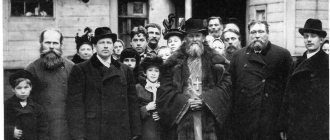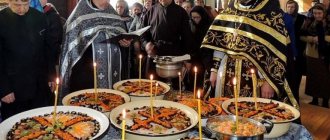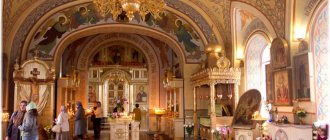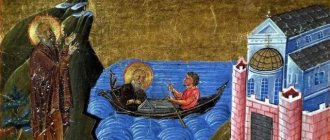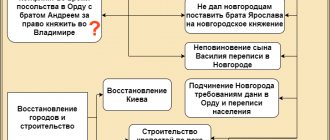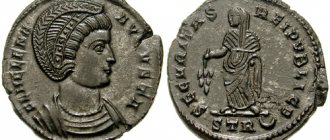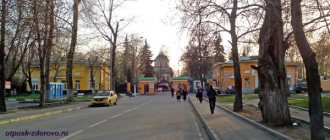This term has other meanings, see Tomsky.
Orthodoxy Theodore of Tomsk.
Portrait (website Achinsk deanery) Small coat of arms of the Russian Empire, (statesmen) St. Theodore ( in the center
), Peter and Domna of Tomsk.
Icon, city of Tomsk Icon of St. Theodore.
Tomsk Wonderworker The cell of Theodore Kuzmich on the estate of the merchant Khromov (now the village of Khromovka), photo 1904 Monument to Theodore of Tomsk in the area of the village of Khromovka Chapel of Elder Fedor. Territory of the Mother of God-Alexievsky Monastery, st. Krylova, 12/1
Theodore Tomsky
(elder
Fyodor Kuzmich
, died January 20 (February 1), 1864) - an Orthodox saint who lived in Tomsk in the mid-19th century.
The legend of Theodore Kuzmich is closely connected in Russia with the legend of Saint Vera the Silent
, who in those same years lived in the Syrkovsky monastery near Novgorod in a cell that was a complete copy of the cell of the Elder of Tomsk - despite the great territorial distance.
Legend
According to a widespread legend, the elder was actually Emperor Alexander I. Allegedly, the death of Alexander I in Taganrog was staged, and he himself decided to become the hermit Fyodor Kuzmich.
In 1836, a man who called himself Feodor Kozmin
, aged 70 years, was detained in the Perm province, and on March 26, 1837 he was taken to the village of Zertsaly, Bogotol volost, Achinsk district, Tomsk province. The elder changed his place of residence several times, and spent the last 6 years of his life, at the invitation of the Tomsk merchant Semyon Feofanovich Khromov, in Tomsk. First, in 18959-1863. The elder lived on the estate of the merchant Semyon Khromov outside the eastern outskirts of Tomsk (the site of the current village of Khromovka), and then in the city. Noticed in active correspondence (through those who visited Elder Theodore) in French with the holy elder, who also lived in the Urals in those years. Perhaps he was in correspondence with leading Russian politicians.
Elder Theodore carefully hid his origins, not naming his parents even to high-ranking clergy. He only said that the Holy Church was praying for them. Elder Theodore revealed about himself to the bishop Athanasius of Irkutsk, who often visited him, only that he had the blessing of St. Philaret, Metropolitan of Moscow, for his feat...
Having sorted out the things remaining after the death of Elder Theodore, Khromov found a document about the marriage of Emperor Alexander I with a seal, a chain of the Order of St. Andrew the First-Called and paper with the royal monogram in the form of the letter “A”. In the bag hanging over the bed there were two narrow paper ribbons, written on both sides. But the contents of the “secret notes” were encrypted; the key to the code has not yet been found.
The discovered chain of the Order of St. Andrew the First-Called gives reason to believe that in his pre-spiritual, worldly life, Elder Theodore could have been awarded this highest, rarely awarded order of Russia, which was not in circulation among ordinary people. In any case, modern historians cautiously classify the personality of Theodore Tomsky as one of the persons of the Russian Empire, former Russian princes of imperial blood
.
The city administration plans to restore the “Imperial Quarter” and the estate of Fyodor Kuzmich, located between the street. Krylova, Frunze Ave., lane. Zateevsky and st. Nikitina.[1]
One of the confirmations of the legend is that the grave of the elder was visited by members of the imperial house of Romanov - Grand Duke Alexei Alexandrovich in 1873, and Tsarevich Nicholas, the future Emperor Nicholas II, in 1891.
Days of remembrance: the day of death on February 1 (January 20 according to the Julian calendar) and on the day of the discovery of the relics on July 5.
In 2006, on the initiative and dedication of Tomsk resident Alexandra Gycheva[2], with the support of the enterprise Tomsk Press Agency RosPechat-TomskPechat LLC, led by her, in the village of Khromovka, on the site of the former house of merchant S.F. Khromov and the elder’s cell a monument was erected in honor of Theodore of Tomsk
(Khromovsky proezd, 3). The created monument was consecrated by Archbishop of Tomsk and Asinovsky Rostislav[3] (2006).
Since 2022, a memorable place where in the middle of the 19th century the city estate of the merchant S.F. Khromov and in which also from 1858 to 1864. Elder Feodor Kuzmich lived, - the place of the estate is at the modern address “street. Krylova, 26”, received the status of a cultural heritage site of the Tomsk region
[4].
After the death of the elder, notes were discovered that are known as the “secret of Fyodor Kuzmich”
Before his death, the elder pointed out to the merchant Khromov a bag that hung over the elder’s bed with the words: “In it is my secret.” After the death of Fyodor Kuzmich, the bag was opened and two notes were found.
- First note:
The text on the front side: “ We saw how speechless you were and how happy you were.”
Text on the back: “But when they are silent and do not proclaim.”
- Second note
Front text:
| 1 | 2 | 3 | 4 | |
| O | V | A | zn | |
| i | Dk | eo | amvr | AND THEY COVER STRUFIAN |
| With | h | D | I |
Text on the back:
| IN | IN | ||
| 1837 | MAR.26 | IN | VOL |
| 43 pairs |
There have been repeated attempts to decipher the notes. No original notes have survived. They are believed to have been kidnapped in 1909 under unknown circumstances. Only their photographs have survived, the quality of which makes deciphering difficult.
An encrypted note from the righteous Theodore, found after his death
Transcription by V.V. Baryatinsky
Vladimir Vladimirovich Baryatinsky
publicist
V.V. Baryatinsky, one of the researchers of the legend about the old man at the end of the 19th century, proposed the following decryption option:
front side of the first note: “You see to what silence your happiness and your word have doomed you”;
reverse side of the first note: “But when the Alexanders are silent, the Pauls do not proclaim”;
front side of the second note: “I hide you, Alexander, like an ostrich hiding its head under its wing”;
reverse side of the second note: “1837 MAR26”, “v.vol”, “43 Par”.
Transcript by I. S. Petrov
The second transcript was provided by Ivan Petrov, a teacher at the St. Petersburg Theater School. Grand Duke Nikolai Mikhailovich later wrote about Petrov’s decryption in his work about Fyodor Kuzmich.
“Se Zeus I.E.V. Nikolai Pavlovich, without conscience, exiled Alexander from his (what) I now treacherously cry out to my suffering brother May my Power arise, 1837 Mar. 26th."
Sources
Movie
- “Le secret du Tsar” ( historical document, French
). Directed by Marc Jeanson; year 2014.
Literature
- Alexander I = Elder Fyodor Kuzmich? / Preface G. Balitsky; K. Mikhailova. — : “Zakharov”, 2010. — 352 p. — ISBN 978-5-8159-0960-1.
- Adrianov A.V.
Elder Fyodor Kuzmich / article from the book: The City of Tomsk. - Tomsk: Publication of the Siberian Printing Partnership in Tomsk, 1912. - Baratyansky V.V.
Royal mystic (Emperor Alexander I - Theodore Kozmich). - St. Petersburg, 1912. Reissue: - [B. m.]: “Skaz”, 1990. - 154 p. - Betskoy P.
The Mystery of F.K. [about Elder Theodore Kuzmich]. — : “OLMA-PRESS”, “Ex Libris”, 2004. — 315 p. - Vasilich G.
Emperor Alexander I and Elder Theodore Kuzmich. [Reprint. reproduction of the 4th ed. with fig., executed photo-tint engraving, 1911]. — : “Contemporary”, 1991. — 155 p. - Vasiliev N.
The Legend of the Death of Alexander I, or the Mystery of the Siberian Elder Fyodor Kuzmich. - : Joint Soviet-American. Enterprise TO "Start", 1991. - 68 p. - Guryev N.A.
Mysterious old man. - Tomsk, 1900. - Two monarchs and the mysterious old man Theodore Kozmich. — : “Skeet”, 1992. — 173 p.
- Elder Emperor Theodore Kuzmich [About Alexander I]. — : “Palomnik”, 2002. — 245 p.
- Kudryashov K.V.
Alexander the First and the mystery of Fyodor Kozmich [reprint]. - : NPO "All-Union Book Chamber", 1990. - 85 p. - Kuznetsov-Krasnoyarsky I.P.
Elder Theodore Kozmich // Historical Bulletin. - St. Petersburg, 1895. - Legends about the death of Emperor Alexander Pavlovich (From the past). - : “E.Z. Zakharov", 1897. - 8 p.
- Mironenko S.V.
Pages of the secret history of autocracy. Political history of Russia in the first half of the 19th century. —: “Thought”, 1990. — 236 p. — ISBN 5-244-00406-9. - Mikhailov K.N.
Emperor Alexander I. Elder Theodore Kozmich. Historical research. - St. Petersburg: “Prometheus”, 1914. - 295 p. - Nikolaev V.A.
Alexander the First - Elder Theodore Kuzmich. - East. biogr. - San Francisco (USA): Globe, 1984. - 482 p. - Okun S.B., Belyanchikov N.N.
Is there a “secret of Fyodor Kuzmich”?
// Questions of history. - , 1967. - No. 1. - Electronic resource
: annales.info. - Privalikhin V.I.
So was Elder Fyodor Kuzmich Emperor Alexander I? Historical research. - Tomsk, 2004. - 130 p. — ISBN 5-9528-0022-X. - Romanov N.M. [Grand Duke]. The legend of the death of Emperor Alexander I in Siberia in the image of the elder Fyodor Kozmich. - St. Petersburg: publisher A.S. Suvorin, 1907. - 49 p.
- Serebrennikov A.N.
Great legend: Emperor Alexander I and elder Fyodor Kuzmich. - San Francisco (USA), 1967. - 48 p. - A story about the life and exploits of the great servant of God, Elder Theodore Kuzmich, who labored within the Tomsk province from 1837 to 1864. / 3rd ed., rev. and additional — , 1894. The story of the life and exploits of the great servant of God, elder Theodore Kuzmich, who labored within the Tomsk province from 1837 to 1864 / [preface. ed. E. Zakharova]. — Ed. 2nd, rev. and additional - St. Petersburg: Publication of Elisha and his son Anton Zakharov, 1892 (Printing House of Charity for Poor Young Children). — 54 p., [2] l. ill., portraits, diagrams. — Electronic resource
: elib.tomsk.ru.
Fedor Kuzmich // Encyclopedia of the Tomsk Region.
T.2: N - Y. - Tomsk: Tomsk University Publishing House, 2009. - P. 863-864. — ISBN 978-5-7511-1917-1. — Electronic resource
: vital.lib.tsu.ru.
Alexander I and elder Fyodor Kuzmich. - [B.m.]: Hermitage IN BREVI, 2005. - 24 p. — ISBN 5-93572-174-0.
: pravchtenie.ru.
Alexander the Blessed - holy elder Fyodor of Tomsk: historical research. - Tomsk: "Siberian Publishing House", 2001. - 325 p.
Why did Emperor Alexander the First “turn” into the Tomsk elder Fyodor Kuzmich.
Experts say: the legend about the fictitious death of the autocrat is very similar to the truth // Komsomolskaya Pravda in Tomsk (newspaper). - Tomsk, 2015. - August 1. — Electronic resource
: www.tomsk.kp.ru, illus.
Notes
- In Tomsk, work begins on the restoration of the “Imperial Quarter” and the estate of Fyodor Kuzmich
- A.A. Since 2009, Gycheva has been the church warden of the Orthodox parish of the Church of Blessed Xenia of Petersburg in the village of Aleksandrovskoye (Tomsk district).
- His Eminence Vladyko Rostislav (Devyatov) was elevated to the rank of Metropolitan of Tomsk and Asinovsky on March 4, 2013.
- Administration of the Tomsk region. Official "List of cultural heritage sites of regional significance." P. 150.
- Diocese: an examination of the remains of Tomsk Elder Fyodor may be carried out in the near future (05/25/2017).
Links
- Article in Russian Wikipedia
- Holy Righteous Elder Theodore of Tomsk
- Elder Theodore of Tomsk - Russian Emperor Alexander I?
- The Tomsk legend will remain a legend or the story of how the Tomsk diocese and forensic experts did not share the elder
- In Tomsk, for the Russia-EU summit, a quarter associated with the legend of Emperor Alexander I is being reconstructed
- Elder Theodore of Tomsk in his life
- Newspaper “Literary Russia”: What is impossible for men is possible for God (No. 20 of 05/16/2008)
- E-Reading.club: “Life in Tomsk and new identifications”
- Federal newspaper “Sobesednik” (02/01/2020): What is stopping you from unraveling the mystery of Alexander I and elder Fyodor Kuzmich?
- News Agency "Tomsk Review" (07/10/2020): Mysterious Fyodor Kuzmich. How the relics of the famous wanderer were found in Tomsk
The mysterious death of Alexander the Pious
The Emperor died in 1825 from a short illness; his coffin remained closed during the funeral. His younger brother Nicholas took his place on the royal throne. There is no consensus among historians about the possible staging of the monarch's death. It is difficult to say with certainty whether Alexander I could give up state affairs to spend the rest of his life in solitude, or whether this is just a beautiful legend.
During the reign of Alexander I, many reforms were carried out aimed at improving the lives of ordinary people. Victory in the war with Napoleon raised the authority of the monarch in the eyes of ordinary people, for which he was nicknamed Alexander the Blessed.
Emperor Alexander I
Unlike his father, Alexander Pavlovich enjoyed the love and respect of his subjects, as evidenced by the folk songs composed in his honor. The monarch had a lot of time ahead to continue reforms and fight for the well-being of the people. Why, in this case, did he decide to leave the throne, if the legend about his hermithood is true?
According to eyewitnesses, Alexander I was burdened by participation in a conspiracy against his father, Paul I. It so happened that Alexander I took the throne after an involuntary parricide, although he only gave his consent to the removal of his distraught father from power. The sin of regicide did not let go of the monarch even after many years.
Recently, the emperor's character has undergone changes; he became humble and pious, devoted a lot of time to prayer, and could often be seen kneeling in front of the iconostasis. This gave rise to the idea that the emperor decided to leave the throne and become a beggar wanderer.
During the reign of Alexander III, the sarcophagus of the autocrat was opened and turned out to be empty. Thus, rumors about the suspicious death of the emperor were confirmed. An opinion arose that after the staged funeral, Alexander went to the desert to Seraphim of Sarov himself, and he accepted him as a student.
Interesting! The emperor took a new name for himself - Fedor and took the path of hermithood. They say that Nicholas I personally traveled to the Sarov Hermitage and met with Fyodor Kuzmich there.


